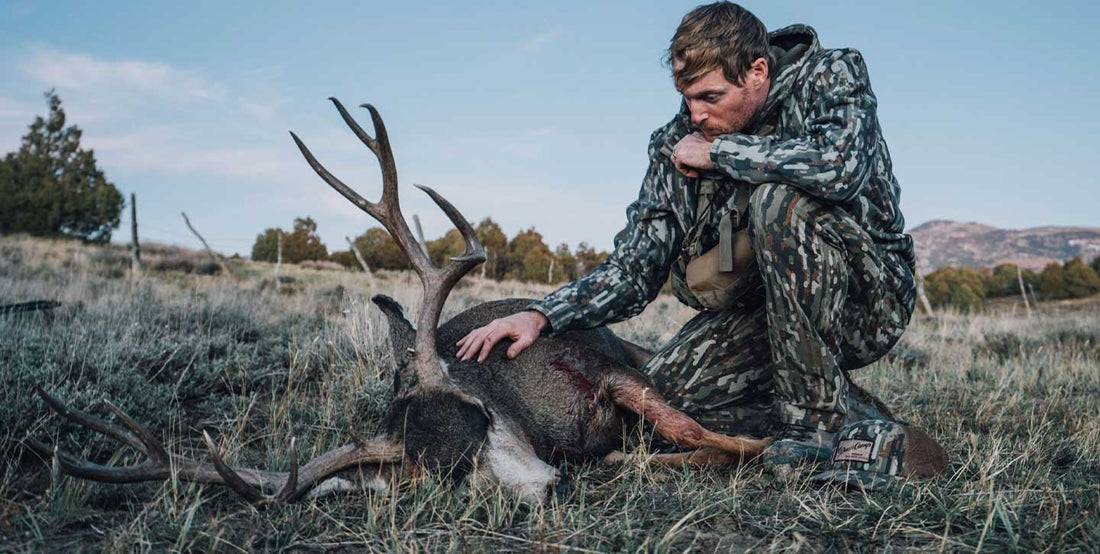WHY WE HUNT BY MARSHALL SEEDORFF
Force of Nature
(main image photo credit: Asher Koles - @bloodknots)
Hunting season is officially here! Our very own Marshall Seedorff shares his insight on how important hunting is to conservation, how it can help reconnect you with nature, and the life lessons that he has learned along the way.
If you're new to hunting, or a have hunted for years, this interview truly encapsulates the beautiful relationship between man and nature.
1. WHEN DID YOU START HUNTING?
I was first introduced to hunting waterfowl via my uncle, who is the single most influential person in piquing my interest in not only hunting but wildlife and conservation. I was probably about 12 or 13 the first time I went duck hunting with him. I was hooked immediately.
2. WHY DO YOU HUNT?
In my view, being in nature and procuring food is an integral part of the human experience. It grounds you in the role we play in the world we live in. I hunt because I feel a strong primal connection to the land and the animals. Hunting gives me the opportunity to not only get out and see nature but be a part of nature. It offers the full spectrum of emotional experiences and brings me to places most humans today will never set foot. It provides all of the red meat my family eats.
3. HOW DOES HUNTING SHAPE YOUR PERSONAL VALUES?
Being a hunter and developing an understanding of the impact we as humans have on ecosystems has made me prioritize the importance of conservation programs and habitat preservation. If you care about wildlife, protecting habitat should be your focus.
4. I KNOW YOU TYPICALLY PASS ON SOMETIMES SEVERAL ANIMALS EARLY ON IN A HUNT. WHY IS THAT?
Part of hunting is the enjoyment of the challenge and excitement in the pursuit of game. While hunting is how I procure all of the red meat for our household, I'm blessed to have enough opportunities to hunt throughout the year that I can afford to seek out mature animals and pass on younger animals. Additionally, many tags may be restricted to the harvest of mature animals. Whether due to regulations or personal preference, I like to target mature animals that are a good representation of their species. In this process, I may pass on opportunities at younger animals, but passing on immature animals increases the challenge, extends the hunt, and ensures that the animals I do ultimately harvest have had a chance to live their life into maturity and pass on their genes.
5. WHERE IS YOUR FAVORITE PLACE TO HUNT?
Anywhere I can get out of a blind and pursue animals on foot through a technique called spot & stalk. While blinds and hunting stands are certainly effective, and I'm in no way against them, my preference is to hunt on the move. This brings in elements of physical fitness and can take you to some pretty epic places.
6. WHAT STEREOTYPES AROUND HUNTING ARE THE MOST DAMAGING TO THE COMMUNITY?
The classic hunting stereotype bills all hunters as rednecks (rich or poor) who are only concerned with killing animals for trophy. The term trophy hunting has been weaponized against all hunters and the community at large. In my experience, the vast majority of hunters have great reverence for the game they pursue and the meat that the pursuit can provide. In most cases, it's actually illegal to discard the meat from a hunted animal which I don't think many people outside of the hunting community realize. That term "troPHy hunting" doesn't make sense. I like big antlers as much as anyone, and I'm sure someone could label me as a trophy hunter because I pass on immature animals in pursuit of mature ones who also have big antlers. That said, I eat EVERYTHING that I hunt. I am more passionate about conserving wildlife and wildlife habitat than most people I know and more knowledgeable about not only huntable species but all types of plants and animals. Hunting to me, is 50% about the experience, challenge, and sport and 50% about the meat.
7. WHAT IS YOUR MOST MEMORABLE EXPERIENCE?
I'll list some highlights:
- Elk hunting on horseback in the backcountry of CO and surviving a blizzard camped out at 12,000 ft.
- Stalking in and successfully killing my first pronghorn with a bow.
- My first mature whitetail buck when I was young.
- My first bull elk on public land with my bow. Killing a bear with my bow and packing it out of the backcountry. Packing a wild sheep ram out of the Rio grande canyon in West Texas. Every time I get to watch and listen to clouds of waterfowl fill the sky over marshlands.
8. WHAT LESSONS HAS HUNTING TAUGHT YOU?
- We as humans have to acknowledge the role we play in nature.
- Humans have modified and infiltrated most ecosystems to the point that we have no choice but to actively manage wildlife.
- Hunting is the most effective and fulfilling tool to manage wildlife populations.
- Habitat loss is absolutely the most critical issue facing wildlife.

